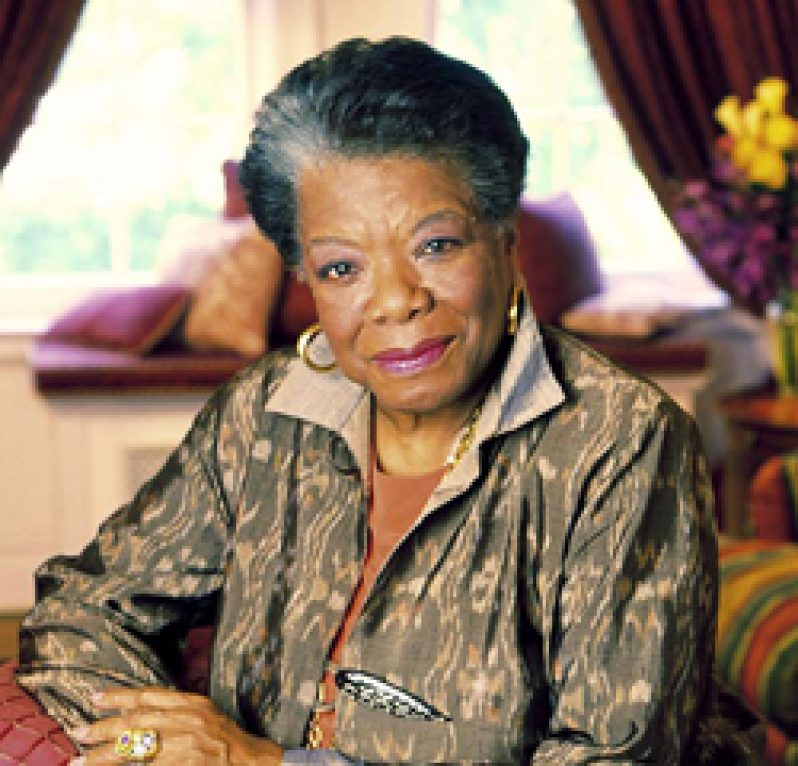BEST known for portrayals of strong African American women in her writings, Maya Angelou, who was born Marguerite Ann Johnson on April 4, 1928 in St. Louis, Missouri, is an American author, poet, performer, and civil rights activist.
 Characteristically using a first-person point of view and the rhythms of folk songs, she writes of the African-American woman’s coming-of-age, of struggles with discrimination, of the African and West Indian cultural heritage, and of the acceptance of the past.
Characteristically using a first-person point of view and the rhythms of folk songs, she writes of the African-American woman’s coming-of-age, of struggles with discrimination, of the African and West Indian cultural heritage, and of the acceptance of the past.
Angelou was a member of the Harlem Writers Guild in the late 1950s, was active in the civil rights movement, and served as a Northern Coordinator of Dr Martin Luther King’s Southern Christian Leadership Conference.
The child of divorce, she spent most of her childhood living with her grandmother in Stamps, Arkansas, the place she calls her hometown. After graduating with honours from Lafayette County Training School in 1940, Angelou was reunited with her mother in San Francisco. At the age of 16, she graduated from high school, gave birth to her son, Guy, and began a series of jobs, including cooking and waiting tables.
Career
Angelou’s career in the arts began on the West Coast as a calypso performer and cabaret entertainer, and as a dancer in a touring company production of Porgy and Bess. She adopted the stage name ‘Maya Angelou’ in 1953.
“Maya” was what her brother called her as a child, and “Angelou” was based on the last name of Tosh Angelos, whom she had married the year before. Upon moving to New York City in the mid-1950s, she attended meetings of the Harlem Writers Guild, won parts in the off-Broadway musical Calypso Heatwave (1957) and the Jean Genet drama The Blacks (1961), and recorded an album of calypso music. In 1960, she wrote and produced a revue entitled Freedom Cabaret as a way of raising money for the civil rights movement.
In 1970, she published the first of her autobiographical books, the popular and widely acclaimed “I Know Why the Caged Bird Sings”. In it she describes her rape at the age of seven, and subsequent five years of self-imposed speechlessness. It brought her international recognition, and she was nominated for a National Book Award.
The series of autobiographical books continued with Gather Together in My Name (1974), Singin’ and Swingin’ and Gettin’ Merry Like Christmas (1976), The Heart of a Woman (1981), All God’s Children Need Traveling Shoes (1986), and A Song Flung Up to Heaven (2002). These writings stress the themes of courage, perseverance, self-acceptance, and the realization of an individual’s full potential.
She has been awarded over 30 honorary degrees, and was nominated for a Pulitzer Prize for her 1971 volume of poetry, “Just Give Me a Cool Drink of Water Before I Die”. Subsequent poetry collections include Oh Pray My Wings Are Gonna Fit Me Well (1975), And Still I Rise (1978), Shaker, Why Don’t You Sing? (1983), Now Sheba Sings the Song (1987), I Shall Not Be Moved (1990), and Phenomenal Woman (1994). The Complete Collected Poems of Maya Angelou appeared in 1994. “Wouldn’t Take Nothing for My Journey Now”, a book of inspirational meditations on life, was published in 1993. A collection of essays, “Even the Stars Look Lonesome”, appeared in 1997.
Cookbook
In 2004, Angelou published a cookbook with anecdotes from her past, Hallelujah! The Welcome Table: A Lifetime of Memories with Recipes.
Since 1991, she has taught at Wake Forest University in Winston Salem, North Carolina, where she holds the first Lifetime Reynolds Professorship of American Studies. Since the 1990s, she has made about 80 appearances per year on the lecture circuit.
In 1993, Angelou recited her poem “On the Pulse of the morning” at President Bill Clinton’s inauguration, thus becoming the first poet to make an inaugural recitation since Robert Frost at John F Kennedy’s inauguration in 1961.
In 1995, she was recognized for having the longest running record (two years) on The New York Times Paperback Non-fiction best seller list.
She is highly respected as a spokesperson for African-American men and women. Angelou’s work is often categorized as autobiographical fiction. She has, however, made a deliberate attempt to challenge the common structure of the biography by critiquing, changing and expanding the genre. Her books, centred on themes such as identity, family and racism, are often used as set texts in schools and universities internationally.
Angelou was the first African-American woman to direct a major motion picture, “Down in the Delta”, in 1998 at the age of seventy.
Angelou has acted in several television broadcasts, including the mini-series Roots (1977) and the weekly drama Touched by an Angel. She has received many awards and honorary degrees, including Grammy Awards (1994 and 1996) for her recordings of her poetry on the albums On the Pulse of Morning (1993) and Phenomenal Woman (1995).
In November 2010, President Barack Obama announced that Angelou would receive the Presidential Medal of Freedom along with President George H.W Bush, businessman Warren Buffet, and civil rights activist, John Lewis.
Source: Historical Collector’s Edition, Issue 13, 2011, Encarta Encyclopedia



.jpg)








